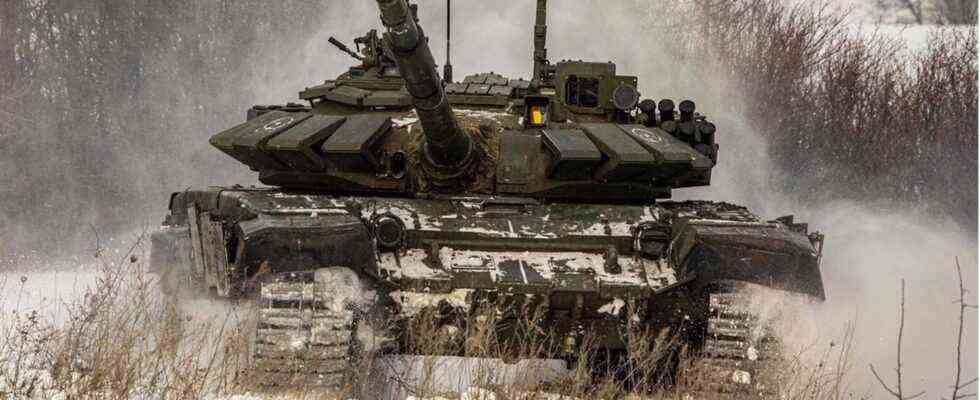Russia vs Ukraine
The week of decisions about war and peace in Europe
Russian tank during a military exercise in the Leningrad region. The photo was made available by the press service of the Russian Ministry of Defense on February 14.
© Russian Defense Ministry Press Service/AP/DPA
In the middle of the Ukraine conflict, Olaf Scholz travels to Kiev and Moscow. Also: Meeting of the OSCE States. Moscow’s response to NATO paper. And at the weekend, the Munich Security Conference without representatives from Russia. The next few days will decide how the conflict between Russia and Ukraine will continue.
According to the US government, Russia could invade Ukraine “at any time”. The secret services have even named a specific day: Wednesday. It would be the day after Olaf Scholz’s inaugural visit to Moscow. There, in the Kremlin, the leadership reacted tight-lipped to such “announcements”, calling them “provocative speculation” and “hysteria”. Why this date is circulating, whether it might be part of a disinformation campaign, and if so, by whom exactly: unclear.
It’s confrontational
What is certain for experts, on the other hand, is that the crisis will be resolved this week and next on the home straight. “The next 10 days will be crucial,” said former US Ambassador to Georgia Ian Kelly. the AP news agency. Timofei Bordashev of the Moscow Center for European Studies said: “Russia and the United States are approaching the height of their conflict of interest over the shape of the European order.”
In view of the tensions, Americans and Europeans are preparing for a possible escalation. Several states, including Germany, Spain, Italy and the Netherlands, called on their citizens to leave Ukraine. Great Britain, Australia and the USA, among others, had previously done so. “Russia’s brazen demands and the equally harsh rejection by the USA have been driving the international agenda in the direction of confrontation more than ever since the Cold War,” said Bordashev.
It should also play a role that not all sides always follow the rules. For example, the Ukrainian government is demanding that Russia comply with the OSCE agreement on transparency regarding troop movements. The government in Moscow ignored a request from Kiev, citing the Vienna Document of the Organization for Security and Cooperation in Europe, said Foreign Minister Dmytro Kuleba. The text is intended to promote the exchange of information on the activities of the armed forces of the organization’s 57 member countries. Moscow must “fulfill its obligations in order to reduce tensions,” said Kuleba. His country is therefore “convening a meeting with Russia and all member states (of the OSCE) within 48 hours”.
The Ukrainian President Volodymyr Zelenskyj has also invited US President Joe Biden to a meeting for the “coming days”. “I am convinced that your visit to Kiev would send a strong signal and help stabilize the situation,” the President’s office quoted as saying from a phone call between the two heads of state. A statement from the White House after the call made no mention of the invitation.
More than 100,000 Russian soldiers at the border
According to the White House, in their approximately 50-minute conversation, Biden and Zelenskyj agreed to stick to the principle of “diplomacy and deterrence” towards Russia. According to US statements, Biden “reaffirmed the commitment of the United States to the sovereignty and territorial integrity of Ukraine”.
According to Western information, Moscow has massed more than 100,000 soldiers on the border with Ukraine, but denies any plans of attack. The Kremlin says the reason for the deployment of troops is that the country feels threatened by NATO. For this reason, Ukraine should not become a member of the defense alliance – which, according to leading NATO officials, is not up for debate anyway. Most recently, the Ukrainian ambassador to Great Britain described reports that he had brought up renunciation of NATO membership as a “misunderstanding”. Vadim Pristaiko said Ukraine’s goal, enshrined in the country’s constitution, to become a long-term member of the military alliance, remains unchanged.
Russian troops on the border with Ukraine: These satellite photos make the West nervous
9 images
In the coming days, the United States and NATO are also expecting Russia’s reaction to their proposals for new security agreements. In addition to ending eastward expansion into Ukraine, the government in Moscow had also demanded that NATO forces be withdrawn from the eastern alliance states. However, US Secretary of State Antony Blinken had already made it clear that this demand would not be met.
The security conference also begins in Munich at the weekend, to which 35 heads of state and government, US Vice President Kamala Harris and Foreign Minister Blinken have announced their attendance. Against the background of the tensions, conference head Wolfgang Ischinger campaigned for Russia to take part in the conference. The fact that Moscow has canceled so far is “regrettable”. But he will stay “on the ball”, Ischinger said. “We will try everything to get an authorized Russian spokesman to Munich.”
No attack during the Olympics?
The conference in the Bavarian capital ends on Sunday, just like the Winter Olympics in Beijing. Allegedly, there is some sort of agreement between Russia and China under which Russia will not launch any military action during the sporting event. China’s ambassador in Washington referred to the “time-honored Olympic truce” for the games. However, the Kremlin does not always stick to such agreements: in August 2008, the Russian army invaded Georgia while the Summer Olympics, also in Beijing, were opening.
Sources: DPA, AFP, AP, Munich Security Conference“New York Times“

